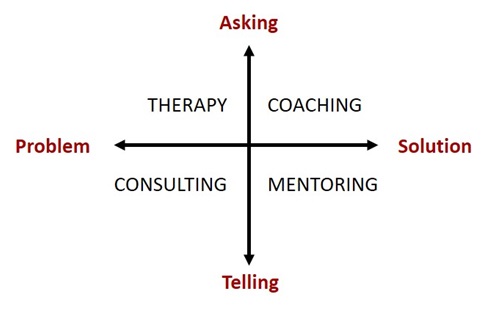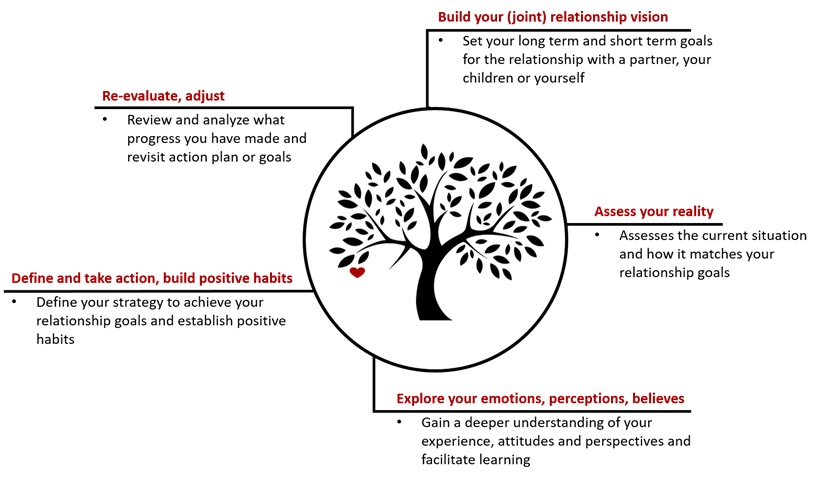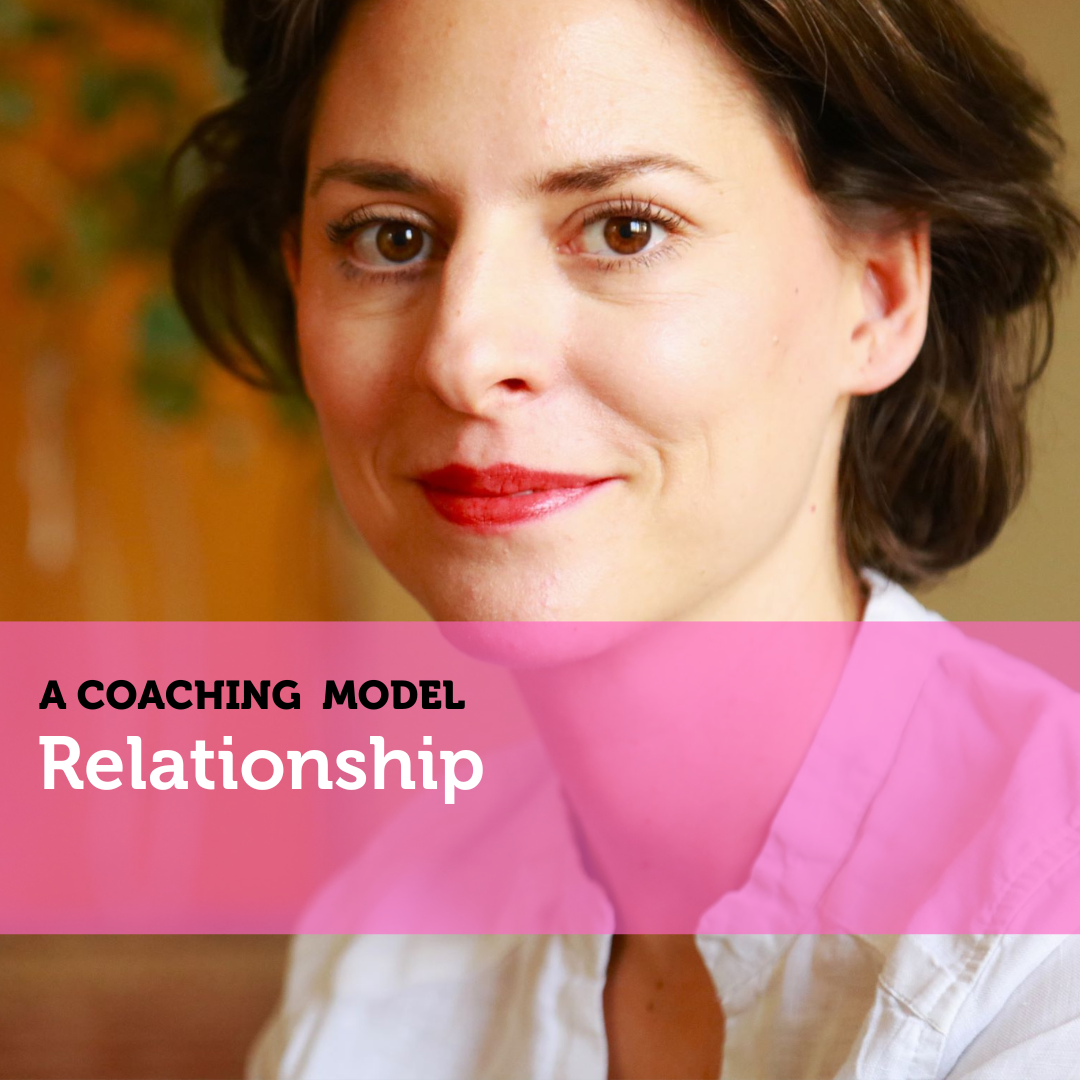A Coaching Model By Julia Paulsson Jandl, Relationship Coach, AUSTRIA
Positive Relationship
As a coach, I help individuals, couples and parents achieve their relationship goals. Whether this is finding a partner, cultivating a deep and lasting relationship as a couple, with a child or friends or whether it is strengthening the relationship with oneself.
“Other people matter”, is what Christopher Peterson, one of the founders of positive psychology used to say when summarizing what positive psychology was about (Peterson, 2008). Undeniably, positive relationships, or their absence, have a profound impact on our well-being. Extensive evidence shows that quality relationships help us live longer and happier lives. Positive relationships can give us a sense of purpose and belonging.
Relationship: How Can Coaching Support You?
Let’s start by exploring what we mean when we talk about coaching. Coaching is a partnership between the coach and you, the client (ICF, 2021). Coaching opens up space to explore new ways of thinking, generate growth and change and promote focused actions that will support you achieve your relationship goals or get you closer than you have ever been before.
Coaching conversations differ from regular day-to-day conversations in that they follow a carefully crafted structure that powerfully supports you to access new ways of thinking and insight and embed new learning and behavior. Relationship coaching in particular seeks to foster more adaptive relationship attitudes, skills, and the ability to reflect on experiences and take more control of life dynamics (Ives, 2012)
 What is coaching not? It is not consulting, mentoring, counseling, or training. You are the best expert in your own life and you have all resources to effect change. As a coach, I will not instruct you to do something. I will rather support you in tapping into these, often hidden, resources and your strengths. At times – and at your request – I will share some coaching tools. In these instances, I will take off my ‘coaching hat’ and take on more of a mentoring role.
What is coaching not? It is not consulting, mentoring, counseling, or training. You are the best expert in your own life and you have all resources to effect change. As a coach, I will not instruct you to do something. I will rather support you in tapping into these, often hidden, resources and your strengths. At times – and at your request – I will share some coaching tools. In these instances, I will take off my ‘coaching hat’ and take on more of a mentoring role.
Rooted in Research-Based Approaches
Positive psychology is the scientific study of what makes life worth living. I use the findings and tools of positive psychology to support you in opening up new possibilities, accessing personal resources, and enacting change to help you flourish rather than simply survive when it comes to your relationship with yourself, and with others.
Combining Goal-Focused and Developmental Coaching Approaches
I am able to control only that of which I am aware. That of which I am not aware controls me (Whitmore, 2003).
The ability to reflect on life experiences and gain insight into one’s life dynamics are foundational to making informed and effective choices. I apply a combination of goal-focused and developmental coaching and support you opening space for intrapersonal awareness and growth while defining your relationship goals and planning conscious and deliberate action toward achieving these. Questioning and listening are my main tools in supporting you in this.
Applying Systems Thinking
Everything is interconnected. Plants need carbon dioxide, water, and sunlight to thrive. Humans need water, food, and air to survive, but also positive emotion, engagement, meaning, accomplishment, and positive relationships to thrive. In the context of coaching, systems thinking refers to the complex dynamics in which we operate. Systems thinking is a powerful way to understand ourselves, one another, and our environment or systems. This, in turn, helps you to identify key variables at play in your relevant systems, how they interact, and how they help or get in your way when it comes to achieving relationship goals.
Leveraging Your Strength
As part of the process, you will get in touch with your character strengths. Drawing on your best qualities will help you to boost confidence and well-being, manage challenges and accomplish your relationship goals.
Following a Carefully Crafted Structure
The graph below outlines key stages in the coaching process. It is important to emphasize that these stages are not strictly linear but rather cyclical as you progress toward your objectives. I will support you throughout the process and ask open-ended questions that allow you to explore new realms of thinking that are free of judgment.
Build your (joint) relationship vision. Whether you are single, in a committed relationship, or a parent, we all have ideas of what our relationships shall look like. Coaching will help you define your relationship goals with sufficient precision, degree of difficulty, and proximity to make the goal most achievable.
Assess your reality. At this stage, you take stock of your current situation. The coaching process is not a therapeutic intervention and will only draw on the past to the extent that it can help you identify learning.
Explore your emotions, perceptions, and beliefs. Whilst the exploration stage may throw up numerous interesting and valuable areas for growth and change, it is the purpose of coaching to zoom in on where the ‘issue’ lies (Yves, 2012). Coaching helps to identify barriers but, importantly, also strengths and resources to overcome them. The learning at this stage goes deep, fosters self-awareness, and opens up opportunities for growth.
Define and take action, and build positive habits. Capitalizing on the learning and increased self-awareness, you identify the desired changes in attitude, habits, and behavior. Supported by the coach, you devise action plans that bring you closer to your relationship goals and to forming or strengthening secure and lasting relationships. Focusing on proximal and distal goals and shoring up motivation helps to break past patterns and create healthy new habits.
Re-evaluate, and adjust. It is important to check in regularly and see whether there is a need to adapt. This is done through more perceptual work, exploration of beliefs and identity, and revisiting the vision-building, in order to achieve highly motivated results.
Learn How to Create Your Own Coaching Model
Your Coaching Model reflects your values,
philosophies, and beliefs and must communicate who you will coach
and the problems you will solve. Read more about creating your coaching model
References
International Coaching Federation (ICF) (2021) ‘ICF Code of Ethics’. (Accessed: 25 March 2022)
Yossi Ives (2012). ‘What is Relationship Coaching?’. International Journal of Evidence-Based Coaching and Mentoring. Vol 10, No. 2, August 2012.
Whitmore John (2003). Coaching for performance. London: Nicholas Brealey.
Christopher Peterson (2008). ‘Other people matter Two Examples’. (Accessed on 22 June 2022)
Mental Health Foundation (2016). ‘Relationships in the 21st Century (Accessed on 22 June 2022)
Steve Wolinski (2010). ‘Coaching Leaders: A Systems Approach’.
